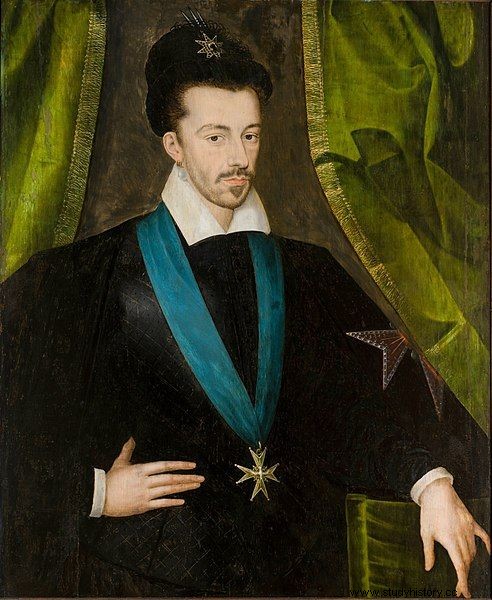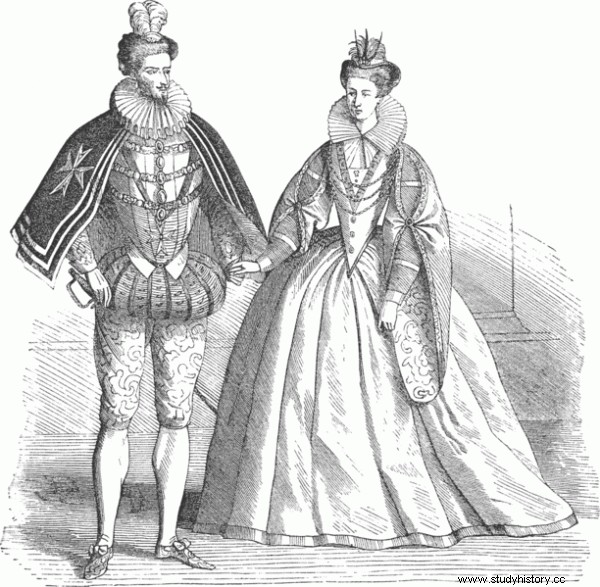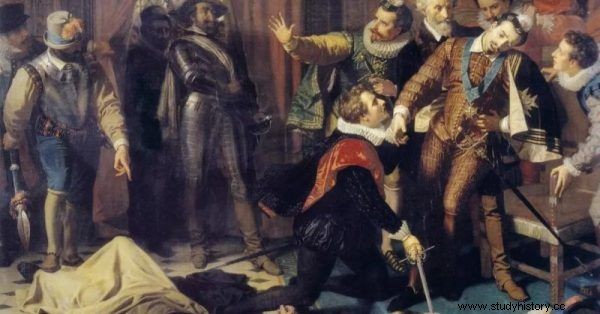He did not go down in golden letters in the history of Poland - his frivolity, "women's" clothes and makeup aroused widespread indignation, and his retreat from the country only sealed a bad impression. However, even those who sincerely detested the king could not have imagined the embarrassing circumstances of his farewell to the world. Death found him… in the toilet.
The election of Henryk Valois as the king of Poland turned out to be unfortunate - after only half a year of "office" under the cover of night, he fled the country to sit on the French throne (although he maintained that he would return when he would put things in order at home, but - how many others - and he did not keep that promise.) Later in Krakow, people said about him:"Rex Henricus played a trick on Poland, he was chosen at night, he came at night, he left at night".
Paradoxically in France he was (and is still considered to be) an outstanding ruler. Professor Maciej Serwański comments:
He is considered to be one of the most talented administrators and the most industrious monarchs. A few items borrowed from Poland remained in Paris after him, for example the sewage system of the Louvre (...). Until the end of his life, he also called himself King of Poland and Grand Duke of Lithuania. On one of the towers of the Conciergerie Palace on the Cité Island in the heart of Paris, you can see the clock donated by Henry III, with the Polish eagle, the Lithuanian chase and the French lilies on the dial.
Game of Thrones
On the Vistula River, the positive assessment of Valois' rule by the French may come as a surprise. The more so as his reign in his native country fell during the period of uninterrupted religious conflicts and family conflicts.
When his younger brother, Franz Hercules Valois died without issue in 1584, it became clear that the end of the dynasty was approaching great steps. After all, Henry (ruling France as Henry III) also had no children.
According to the guidelines of the Salic law, after the death of the ruler, the throne should pass to his closest male relative. It was unfortunate that the relative was Henry of Navarre. Horror - Protestant.

Henryk Walezy did not stay on the Polish throne for too long
Meanwhile, from the 1660s in France, there was a war between the Catholic camp gathered around the Catholic League supported by Spain and the Huguenots. In order to prevent the coronation of the "heretic" as king, representatives of the League on July 7, 1585 signed an agreement with Walezy, according to which he was to oppose Henryk Nawarski and deal with the Protestant movement once and for all.
Thus began the dynastic struggle known as the war of the three Henryków. Soon the former ruler of Poland was to pay for her with his life.
Bloody Star
The defeat of Valois against the Huguenots at Coutras in 1587 caused the circles concentrated around the League to turn their backs on him. Philippe Charlier reports:
The sermons preached by the parish priests served to spread political propaganda in line with the expectations of the Catholic camp, the kingdom was inundated with pamphlets stigmatizing Henry III's helplessness against Protestants.
Prince Henry Gwizjusz, who led the League, entered Paris in May 1588. There was a real threat of a coup d'etat, so the monarch - as is his habit - escaped. He took refuge in Chartres, where he remained for several months, despite the fact that his mother - Catherine de Medici - demanded that he return to the capital. He, however, preferred to plan a war with the Catholic camp in the privacy of his hideout.

Henryk Walezy and Ludwika Lotaryńska
And he got his way. On December 24, 1588, on his initiative, Cardinal Ludwik of Lotaryński, who came from the Gwizjusz family, was arrested and then murdered. Prince Gwizjusz himself was also killed. The consequences of these killings were easy to predict. As Charlier describes:
Pope Sysctus V, unable to accept the crime committed by the king's order, and against a clergyman, a few months later, on May 5, 1589, excommunicated Henry III. Immediately there were voices all over France demanding the death of the king. The justification for regicide was to say that the supreme power belongs to the people - killing a tyrant or ruler who despises divine laws would therefore be ... a duty!
"You dirty monk, you killed me!"
The said "duty" was completed on the morning of August 1, 1589 by Jacques Clément, a twenty-two-year-old Dominican connected with the League. The plan of the assassination almost failed - Valois' loyal guards did not want to let the monk reach the king who was sitting ... on the toilet. The stubborn clergyman, however, persuaded them that he had documents of the highest importance, so they took him to the monarch.
Concentrated on reading these "important documents" and immobilized on the "throne", Henry was undoubtedly surprised when the monk stabbed him in the abdomen with a knife. However, he managed to take up his gun and wound the bomber in the face, shouting, "You wicked monk, you killed me!" Valois' bodyguard completed the work and massacred Clément with halberds. The mortally wounded king died the next day (he had previously appointed Henryk Nawarski as his successor).

Henryk Walezy died in the toilet
The royal medics and surgeons who embalmed the monarch's body in the autopsy document noted:
Yesterday, on the second Wednesday of August 1589 (...) we conscientiously examined the body of the deceased Christian king of France and Poland, Henry III, after which only good memories remain (...). After a detailed examination of all the organs in the lower abdomen, we noticed that a part of the small intestine called the ileum had been pierced through with a knife one foot long, which we were shown, still smeared with blood at the length of four fingers, because it was stuck and penetrated deep into the body ( …).
For this reason, the inevitable death was about nineteen hours apart, and His Majesty, the Christian monarch, had experienced weakness and great pains before that :shortness of breath, nausea, constant fever, mood changes and unsatisfied desires, accompanied by great anxiety.
Valois' body was temporarily laid to rest in Compiègne at Saint-Cornille Abbey. Henry of Navarre (who took the throne as Henry IV) did not allow him to be buried in the main necropolis of the French rulers, the Basilica of Saint Denis, because he was prophesied to rest in the same church a week after his predecessor.
Indeed, shortly after the body was transported in 1610, Henry IV died - also at the hands of the Catholic religious fanatic, François Ravaillac. Fate's irony? The poet François de Malherbe summed it up perfectly with the words: "Fortune plays with kings both in life and after their death, so that they remember that they are only human."
